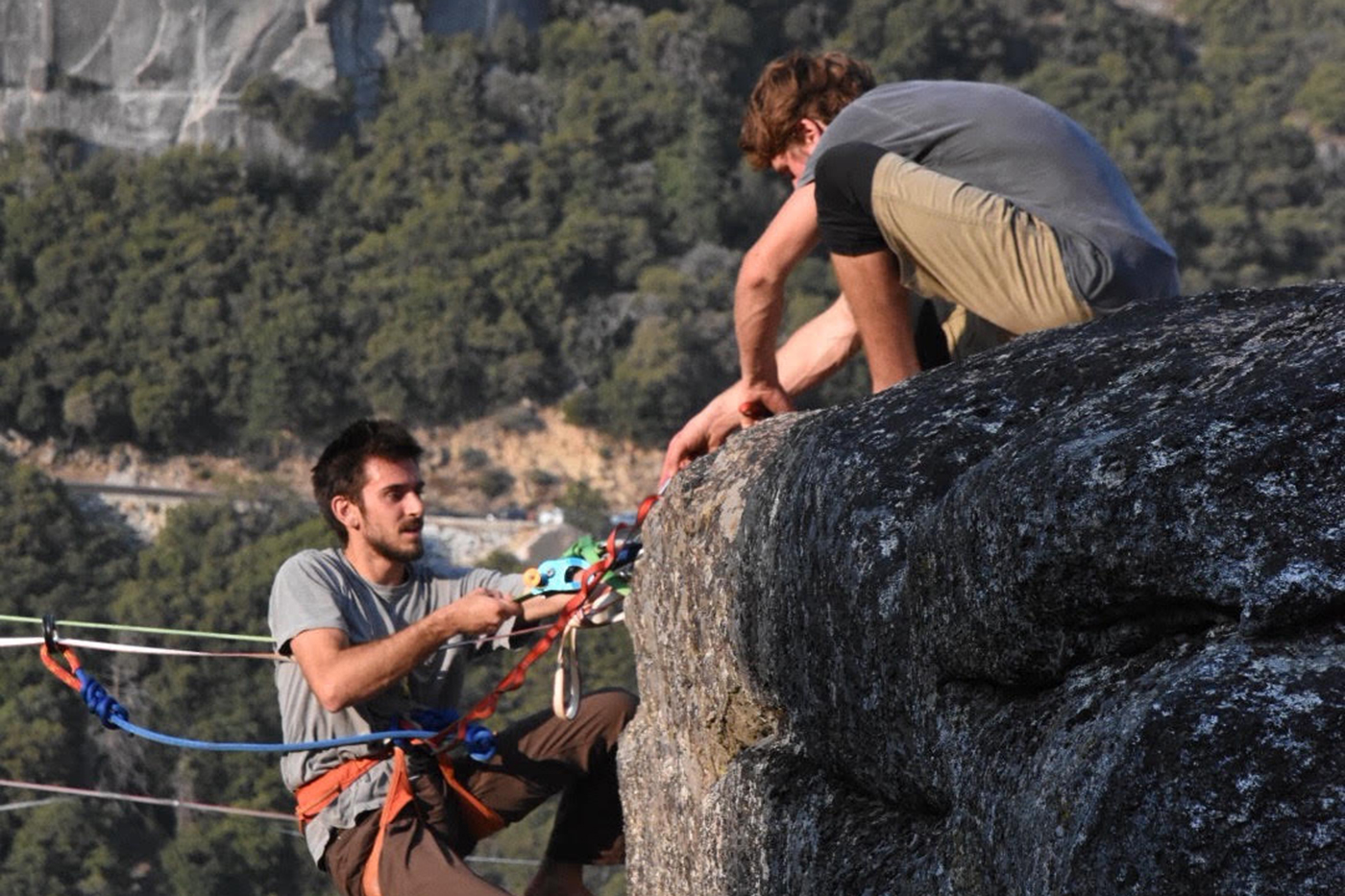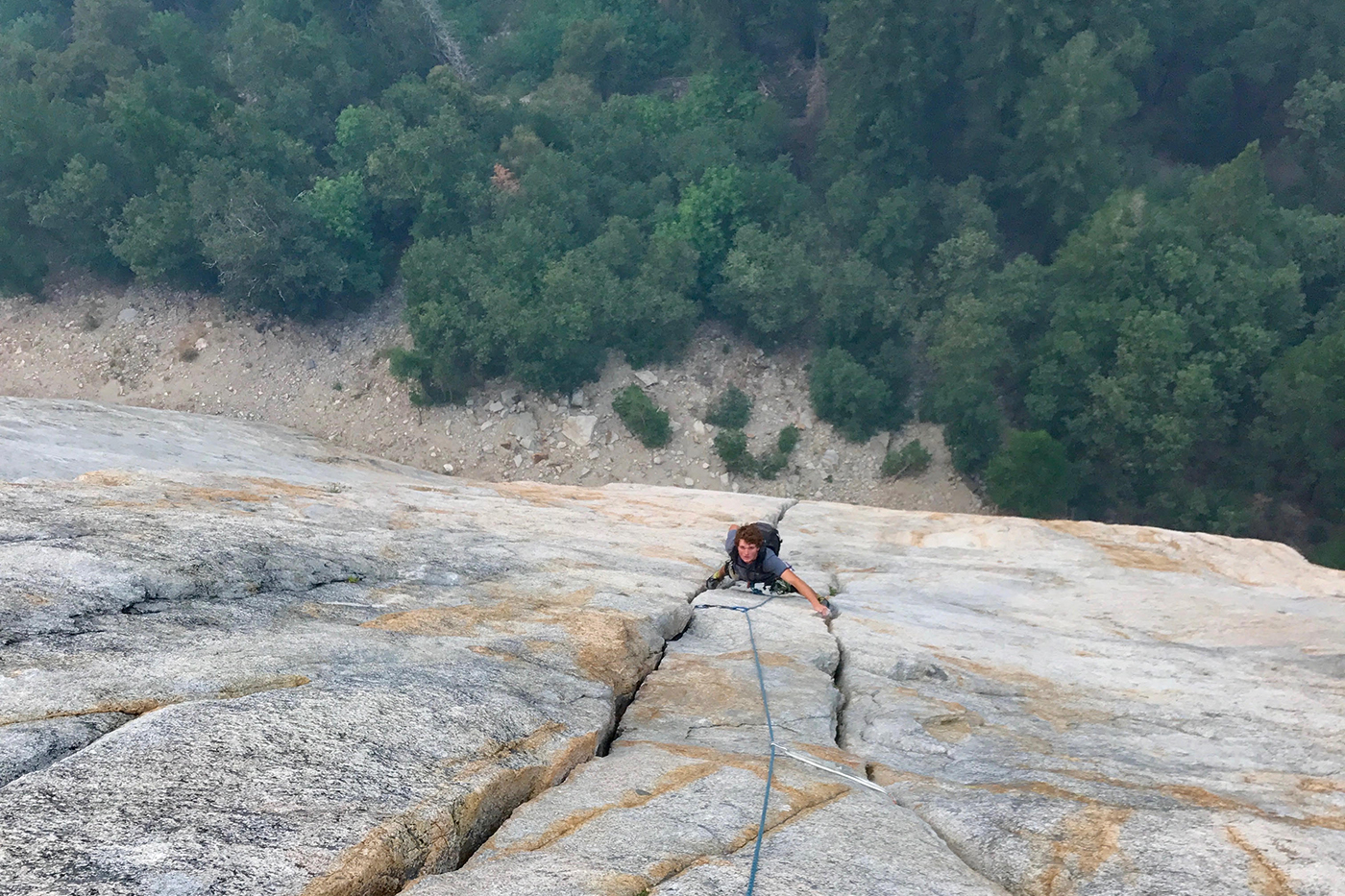While many Cal Poly students look for summer internship opportunities, others take the summer to seek out adventure in any way possible. This four-part mini series will dive into the lives of students who took unique summer jobs to do the latter.
When physics senior Joe Kennedy has an idea in his head, he cannot let it go. He gets a “devilish little look” on his face and rubs his hands together – that is how his friends know he is up to something.
In the middle of the school year in 2018, Kennedy did just that. His friends, physics senior Lisa Swartz and agricultural and environmental plant sciences senior Alex Peña, knew they were about to be pulled into an adventure.
The three of them wanted non-traditional jobs that would allow them to be in a “temple of nature,” as Swartz said, surrounded by granite walls to climb and giant trees to look at out their windows.
“It was all about the place,” Kennedy said. “We didn’t care what we had to do [for work].”
Only a few months later, the three friends set off to spend their summer working and living in Yosemite National Park for 12 weeks.
What they had not anticipated during that time, however, were the wildfires that put a halt to their restaurant and grocery store jobs a few weeks in and forced them to evacuate.
In the Valley
In the first few weeks the friends were in Yosemite, each day was the same: Kennedy and Peña woke up to birds chirping in the trees and the sun shining through the mountains as they brewed coffee out of a french press and sat outside their tent cabin.
Swartz woke up and ran along the valley floors, soaking in all of the beauty around her, observing the things she said were “not your typical up-high view,” but that filled the ground level of the national park.
Each day consisted of hiking, bouldering, highlining and climbing. There was always a new summit to reach the top of before the friends jumped in the lake and biked to work.

“It was nice to live day-by-day not worrying about things,” Peña said.
But that was before things changed quickly and drastically in the valley.
You’re in this beautiful place, on cloud 9, and you get to basically do what you want all the time . . . but then you feel kind of disconnected from the world at times.
A Change of Pace
After three weeks, nature took a turn.
Smoke began to pour in over the mountains, and word of a wildfire (which later became known as the Ferguson Fire) began to spread around the national park.
“It was so stressful,” Kennedy said.
As the fire grew closer to Yosemite, the smoke worsened.
“You would go outside and all of a sudden you couldn’t see anything within 200 feet if the wind was blowing the wrong way,” Kennedy said.
Workers in the valley faced difficulties with breathing and started to leave because of it. The three friends decided to wait it out, waiting to hear from their managers.
“The valley [turned] into a little bubble,” Peña said. “You’re in this beautiful place, on cloud 9, and you get to basically do what you want all the time . . . but then you feel kind of disconnected from the world at times.”
Peña said he remembered hearing all of his co-workers complaining about their own health and safety, but then it hit him that the forest was on fire, and firemen were losing their lives because of it.
“No one was talking about that, everybody was concerned about themselves,” Peña said.
It got to the point, Swartz said, where they were questioning why they should even stay if they could no longer enjoy the outdoors. And then the three friends were told to evacuate – within an hour they grabbed all of their belongings and left the park, not knowing when or if they would return.
“I had a feeling when we left I should pack the things I wanted to keep, “ Swartz said. “When we left the fire was still growing.”
A new adventure
Hundreds of workers left the valley. Kennedy said a herd of them alike — all young people there for the summer, “stoked” about climbing and backpacking — left and drove up to the Eastern Sierras together.
“We all sort of funneled to Bishop,” Kennedy said. “There was a huge meetup of about 20 of us, all living out of our cars and vans.”
People from Romania, Ireland, and all across the United States got together to backpack and hike through the Sierras and Lake Tahoe.
When they had cellular service, Kennedy said they would check for updates on the fires, but the situation did not appeared to have improved since they had left.
“I remember my manager called me a week in saying it was at least another week,” Kennedy said. “I was bummed but also thought, this is sick.”
For two weeks, Kennedy, Swartz, Peña and the new friends they made traveled around, camping, backpacking and exploring areas they had not expected to see over the summer.
During those two weeks, Kennedy and Swartz lived out of his truck – which had a built-in bed, a two-burner stove and drawers.
Peña also slept out of his truck, which was not built-out at the time.
“I was too tall to fit in there,” he said, referring to the backseat of his GMC Sierra. “I was scrunched up like a piece of bacon, all wrinkly and stiff in the mornings.”
Their showers consisted of jumping into lakes or rivers, their eating included the snacks they had packed for Yosemite and their water supply was limited.
After the two-week mark, Peña said he had used up all the money he had made from the summer and could no longer support the camping lifestyle. He packed up and headed back to San Luis Obispo to return to his job at the crops unit on campus, working in the orchard.
Kennedy and Swartz continued on. They backpacked to Mt. Langley, then climbed two routes on the face of Mt. Whitney.
“We had so much freedom to do whatever we wanted,” Kennedy said.
As the fires died down, the smoke continued, but Swartz and Kennedy decided to return to Yosemite for one last week.
They did not return to work but instead continued living in the valley and spent their days climbing and hiking, soaking in the last of their time there.
By the end of their six weeks, Kennedy said he was exhausted from their on-the-road travels. He said they were bummed to leave Yosemite, but it was time to go.
Swartz bought a flight home to Colorado, and Kennedy bought a flight home to Indiana.
“We were only there for six weeks, but it felt like a whole year almost by how much I learned and saw and did there in that short period of time,” Kennedy said.
As far as making money, they all said it was not much but that it did not matter.
“I was making so much in terms of memories and enjoyment,” Swartz said.“I felt rich just with happiness.”
“Most people would think that when you’re making burgers for 40 hours a week that that’s not a very satisfying way to live, but it was some of the happiest weeks of my entire life,” Swartz also said.
A different kind of summer
In the 2019 summer, Kennedy and Swartz decided to focus on internships.
Swartz went to an international lab in Idaho Falls, which she said helped her to learn the type of career she wants, whereas the summer before in Yosemite helped her discover the type of place she wants to be in.
“You don’t have to pick or choose one or the other,” Swartz said. “I realized I can have both.”
As for Kennedy, he said his internship at Rolls-Royce in Indianapolis made him miss his summer of adventure.
After a 9-10 hour shift in an office, he said he would just come home tired, sit on the couch and sigh, “If only I could be in Yosemite again.”
For Peña, the 2019 summer looked a lot different from Swartz’s and Kennedy’s internships.
At the end of the school year, he got a call about working on a commercial fishing boat in Neknak, Alaska.
He accepted the offer right away, not knowing what the job would entail. When he got there, he said Alaska was just what he needed. He lived off the grid for a month and a half without cellular service, sleeping in an abandoned cannery in a shower stall.
The work was hard, he said, but Alaska was simple and raw, whereas Yosemite was fun and easy but full of too many tourists.
Peña, Swartz and Kennedy all said Yosemite taught them that where you are is what matters in life.
They said being in the valley made them realize that anyone can have a non-traditional job at any point in their life.
“What was just a quick summer for us, is [some people’s] forever,” Kennedy said.

